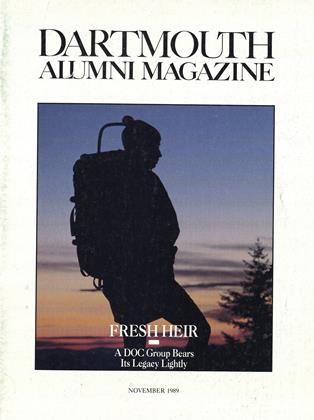Andrew L. Pincus '51, Scenes fromTanglewood (Northeastern University Press) Pincus escorts readers back- stage in this photo-rich view of artistic life at the Tanglewood Music Center. The author, who began covering Tanglewood for the Berkshire Eagle in 1975, reveals the performers, recreates performances, and turns a critic's eye on the arts as he seeks an answer to his own question: "how far should a symphony orchestra—or any institution—go in making great art digestible for a broad public?"
Howard Greene '59 and Robert Minton, Beyond the Ivy Wall: 10 Essential Steps to Graduate School Admission (Little, Brown and Company) In this sequel to their 1987 book, Scaling theIvy Wall: 12 Winning Steps to CollegeAdmission, Greene, one of the nation's leading educational consultants, teams with writer and former teacher and administrator Minton to offer comprehensive advice on how to think about and get into graduate schools. The publisher notes that this is the first book that covers every aspect of graduate school admissions. Anyone applying to grad schools will benefit from the wealth of information the authors offer.
Karl B. Holtzschue '59, Real EstateContracts (Practicing Law Institute); Purchase and Sale of Real Property (Vol. 1 of New York Practice Guide: RealProperty, Matthew Bender); and RealEstate Transactions: Purchase and Sale ofReal Property (Matthew Bender)—An expert on real estate law, Holtzschue presents three how-to-do-it books for lawyers on buying and selling real estate. The author, who is head of the real estate department in the New York law firm of O'Melveny & Myers, is a founding member of the Dartmouth Lawyers Association.
Bruce Ducker '60, Bankroll (E.P. Dutton) "Why would a guy earning seven figures a year doing mergers give it up? For fun." So beckons Ducker's fast-paced third novel, a tale of international finance, fraud, and the development of a con man. Publishers Weekly calls it "intricate and absorbing." The author, who lives in Denver, is a lawyer specializing in corporate and financial law.
William F. Roth Jr. '62, Work andRewards: Redefining Our Work-Life Reality (Praeger)—Roth writes that during his years as a corporate consultant he has observed that "a vast majority of employees on all levels and in most businesses are not satisfied with their working lives, or with their lives in general" and "that despite their frustration, most employees have been forced to accept this situation pretty much as an unavoidable part of their existences." He suggests an alternative to the work ethic: work should offer people the opportunity for personal development. Roth is an associate professor at Moravian College and is a management consultant for major corporations. He recently served as an advisor to a Congressional Task Force on developing a community approach to improving the quality of life.
Peter Dorsen '66 at al., The Minnesota Vikings Change the Play: Team UpAgainst Alcohol and Other DangerousDrugs (Deaconess Press) Dorsen interviewed members of the Vikings about the pressures and responsibilities of being professional athletes and role models. The book gives young fans the chance to hear it straight from the team that there are drug-free ways of coping with life's stresses. Minneapolis-based Dorsen, an internist and a clinical assistant professor at the University of Minnesota, writes frequendy about sports, fitness, and medicine.
William Morgan '66, CollegiateGothic: The Architecture of Rhodes College (University-of Missouri Press) A Professor of Fine Arts at the University of Louisville, Morgan examines the cultural context of the pre-Depression construction of the Rhodes College campus in Memphis. He relates the building of this "Oxbridge in America" to the notion held by the school's patrons that the Gothic style of architecture is essential to the liberal arts.
 View Full Issue
View Full Issue
More From This Issue
-
 Cover Story
Cover StoryFresh Heirs
November 1989 By Heather Killerew '89 -
 Feature
FeatureMaking the Normal Less Normal
November 1989 By Warner R. Traynham '57 -
 Feature
FeatureA Foreign Correspondent's Essential Skill: Packing
November 1989 By Christopher S. Wren '57 -
 Feature
FeatureThe Day I Got Chewed Out By Red Blaik
November 1989 By Rodger S. Harrison '39 -
 Feature
FeatureSILENT TOWER
November 1989 -
 Cover Story
Cover StoryA Woodsy Time Line
November 1989







